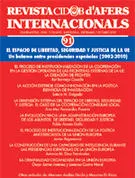Building intelligence capacity during Spain’s presidencies of the European Union (2002-2010)

The development of an independent intelligence capacity within the European Union has been in progress ever since the EU was created. However, this development was slowed down for a long time by the reluctance of states to share intelligence in a scenario in which the problems appeared to be patently local; this way of thinking began to disappear following the Balkans crisis and, later on, with the September 11 attacks. This article analyses the role played by Spain in the aforementioned development during its presidencies, bearing in mind that the three deadliest terrorist attacks (New York-Madrid-London) all took place within this timeframe. The rise of the European agenda, the end of the climate of the Cold War and the realisation of the need to cooperate have all given a legal, structural and political boost to in­creasing cooperation in the intelligence field. This article analyses the main political changes and the legal and structural instruments developed to carry out this cooperation.
Key words: EU, Spain, intelligence, cooperation
The full text articles of this issue are available only in Spanish language